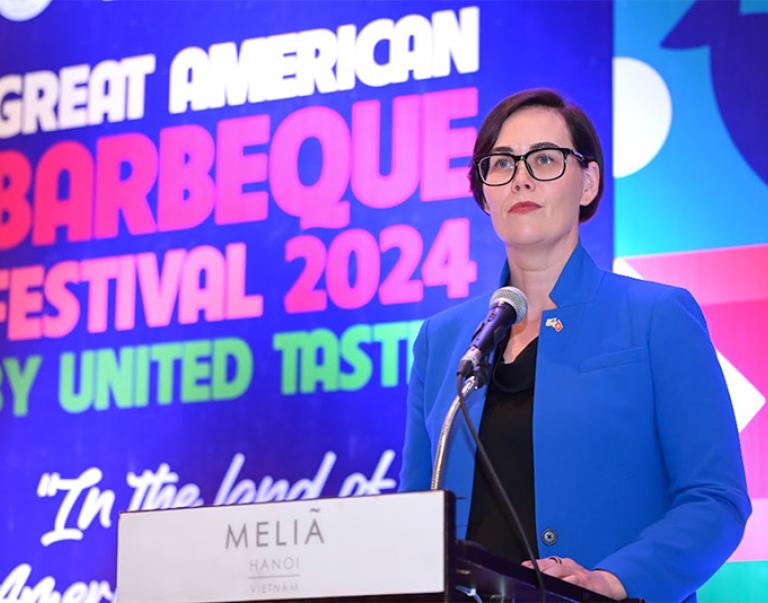WASHINGTON, Nov. 2, 2016 – Agriculture Secretary Tom Vilsack today announced that USDA will grant $20.2 million to help 34 small businesses move forward with innovative research and development projects to benefit food security, natural resources conservation and other agricultural issues. These competitive grants are made through the Small Business Innovation Research (SBIR) program, which is coordinated by the Small Business Administration and administered by 11 federal agencies including the U.S. Department of Agriculture's (USDA) National Institute of Food and Agriculture (NIFA).
"I offer my sincere congratulations to these recipients who have demonstrated that their ideas have strong potential for commercialization and can provide real solutions to tough issues that the food, agriculture and forestry sectors are facing," said Vilsack. "Studies have shown that every dollar invested in agricultural research now returns over $20 to our economy, and that's why USDA has increased our investment in delivering problem-driven and solutions-based science from the farm to the lab to the boardroom. Since 2009, through the Small Business Innovation Research program alone, USDA has awarded nearly 850 research and development grants to American-owned, independently operated, for-profit businesses, allowing hundreds of small businesses to explore their technological potential, and providing an incentive to profit from the commercialization of innovative ideas."
Since 2009, USDA has invested $19 billion in research and development touching the lives of all Americans from farms to the kitchen table and from the air we breathe to the energy that powers our country. Learn more about the many ways USDA scientists are on the cutting edge, helping to protect, secure and improve our food, agricultural and natural resources systems in USDA's Medium Chapter 11: Food and Ag Science Will Shape Our Future.
The Small Business Innovation Research (SBIR) program offers two phases of investment. Phase I invests in feasibility studies of up to $100,000 and Phase II grants of up to $600,000 support project implementation by grantees who successfully completed Phase I. Recipients of today's announcement are all receiving Phase II grants. SBIR funding comes from multiple USDA agencies including NIFA, the Animal and Plant Health Inspection Service, Agricultural Research Service, Economic Research Service, National Agricultural Statistics Service and U.S. Forest Service.
Examples of projects that will receive funding include:
- NVE Corporation in Eden Prairie, Minn., will develop a prototype salmonella pathogen detector that will reduce the potential for disease outbreaks and costly food recalls.
- Nano Terra, Inc. in Cambridge, Mass, will develop a cost-competitive, low-toxicity, ammonium-free long-term fire retardant for use in wildfire management that is less toxic to fish and mammals.
- eWind Solutions, LLC, in Wilsonville, Ore, will create a wind energy system for small farmers that is efficient, affordable and easy to use. The system collects the stronger, more reliable winds found at higher altitudes that are inaccessible from wind towers that most small farmers can currently afford.
- Grafted Growers, LLC, in Tucson, Ariz, will improve crop production methods and strategies and promote energy conservation and efficiency by developing a sustainable indoor crop growing system (SIGS). SIGS will produce large numbers of affordable, higher quality vegetable transplants using fewer resources using less land than current greenhouse and field production systems.
Details on all of the SBIR projects announced today are available on NIFA's SBIR webpage.
Recent examples of successful NIFA-funded SBIR projects include work by the Nitrate Elimination Company, Inc., which developed kits that allow farm managers to determine nitrate accumulation levels on their farms, helping them manage nitrate concentration, reduce costly nitrogen fertilizer use, and reduce pollutants. Whole Trees, LLC, developed a new market in construction for small-diameter round timber, a natural waste product of well-managed forests. Stony Creek Colors used a SBIR grant to develop a more efficient way to produce natural indigo dyes using the indigo plant, replacing more commonly used synthetic indigo that pollutes waterways and is slow to decompose. See more examples of SBIR-funded research and development projects in the SBIR brochure available on the NIFA website.
Since 1983, the SBIR program has awarded more than 2,000 research and development grants to American-owned, independently operated for-profit businesses with up to 500 employees. Funded research areas include air, soil and water; animal production and protection; aquaculture; biofuels and biobased products; food science and nutrition; forests and related resources; plant production and protection—biology and engineering; rural and community development; and small and midsized farms.
NIFA invests in and advances innovative and transformative research, education and extension to solve societal challenges and ensure the long-term viability of agriculture. NIFA supports the best and brightest scientists and extension personnel whose work results in user-inspired, groundbreaking discoveries that combat childhood obesity, improve and sustain rural economic growth, address water availability issues, increase food production, find new sources of energy, mitigate climate variability and ensure food safety.
To learn more about NIFA's impact on agricultural science, visit www.nifa.usda.gov/impacts, sign up for email updates or follow us on Twitter@usda_NIFA, #NIFAimpacts.
#
USDA is an equal opportunity provider, employer and lender.



